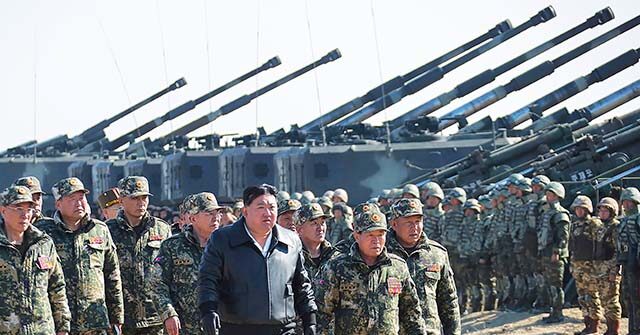Tensions between North and South Korea have escalated significantly, particularly during the administration of President Joe Biden and more specifically over the past year. The most recent discord began when North Korea engaged in unusual behavior, leading to a confirmation from the South Korean military that warning shots were fired near the Demilitarized Zone (DMZ). This followed North Korea’s destructive actions towards roads leading south, described by South Korean officials as “very abnormal.” Pyongyang, under the leadership of Kim Jong-un, has ramped up belligerent rhetoric, including threats to use nuclear weapons against both South Korea and the United States amidst provocations such as balloon attacks filled with trash.
The backdrop to this recent escalation was North Korea’s accusation that South Korea had flown a drone into its airspace, a claim that was categorically denied by the South Korean Joint Chiefs of Staff (JCS). Despite the denial, they acknowledged the possibility that an unauthorized drone from a private entity could have crossed into North Korean airspace. The absence of any material evidence from North Korea supporting these claims raises concerns about the reliability of Pyongyang’s assertions. In conjunction, North Korean military officials had earlier indicated plans to destroy roads leading to South Korea, a measure they described as a self-defensive tactic aimed at curbing potential war. This issued statement highlighted an apparent willingness on North Korea’s part to escalate tensions before a diplomatic resolution can be achieved.
The situation intensified when the South Korean military confirmed the destruction of roads on North Korean territory. While neither South Korean soldiers nor property sustained damage from these explosions, the infrastructure was originally built with South Korean loans to the north, and Seoul maintains expectations for repayment. South Korean authorities condemned these actions as clear violations of inter-Korean agreements and expressed concerns over the implications for regional security. In response to this heightened state of affairs, South Korean forces increased their alertness and surveillance in cooperation with U.S. forces, maintaining a readiness status to counter any potential threats.
North Korea has yet to confirm the reported destruction of the roads through its state media, but Kim Yo-jong, the sister of the North Korean leader, issued an aggressive warning directed at South Korea. Citing what she described as “clear evidence” of South Korean provocation, she threatened severe repercussions for any continued incursions into what she deemed North Korean sovereignty. In her statements, Kim Yo-jong insulted the South Korean government, referring to them derogatorily and warning of potential catastrophic consequences if such actions persisted. Her rhetoric typifies the extreme hostility that characterizes North Korea’s communication with the South.
Beyond the exchange of threats, North Korean state media proclaimed that formal operational plans had been drawn up to mobilize “important firepower” against South Korea were hostilities to resume. This declaration, coupled with the ongoing hostile sentiment, reflects a broader trend in North Korean policy that prioritizes confrontation over diplomacy. Since the cessation of active hostilities in the Korean War under an armistice agreement in 1953, relations between the two Koreas have remained complicated and fraught with conflict. Kim Jong-un’s recent remarks reveal a stark shift away from the previous notion of “reunification,” instead framing the South as an adversary that must be subjugated.
Overall, the situation remains precarious due to the entrenchment of military posturing and incendiary rhetoric from both North and South Korea, as well as their respective allies, the United States and China. Although decades have passed since the Korean War first erupted, a formal peace treaty has yet to be established, leaving the two sides technically still at war. Inter-Korean relations continue to struggle under the weight of mutual distrust, compounded by North Korea’s abandonment of conciliatory dialogue and a renewed emphasis on military might. As tensions rise, the international community watches closely, concerned that any miscalculation might spark a renewed conflict on the Korean Peninsula.

